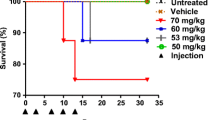Abstract
Bizelesin is a potent synthetic derivative of the anticancer agent CC-1065 that preferentially alkylates and binds the minor grove of DNA. Preclinical animal studies have found bizelesin to be more toxic to beagle dogs than to rodents and that myelosuppression was the dose-limiting toxicity. This toxicity was dose- and time-dependent in all species. Due to the significant difference in the in vivo myelotoxicity between species, it was important to determine which one most closely resembles humans on a pharmacodynamic basis. Therefore, hematopoietic clonal assays were utilized to evaluate the effects of bizelesin on granulocyte-macrophage (CFU-gm) colony formation. Marrow cells were exposed in vitro to bizelesin (0.001–1000 nM) for 1 or 8 h and then assayed for colony formation. There was a 3-log difference in drug concentration at which 100% colony inhibition occurred (1 or 8 h) for murine CFU-gm versus human or canine CFU-gm. The IC70 value after an 8-h bizelesin exposure for human CFU-gm (0.006±0.002 nM) was 2220-times lower than for murine CFU-gm (13.32±8.31 nM). At any given concentration, an 8 h drug exposure resulted in greater colony inhibition than a 1 h exposure for all species (P <0.05). Increasing exposure time from 1 to 8 h increased toxicity to human and canine CFU-gm much more than to murine CFU-gm. The clinically formulated drug solution was a more potent inhibitor of human colony formation than drug dissolved in DMSO. The IC70 value after a 1-h exposure was 1.7 times lower for human CFU-gm with formulated bizelesin (0.106±0.105 nM) than bulk drug in DMSO (0.184±0.044 nM). The results of these in vitro clonal assays were qualitatively consistent with those seen in whole animal studies, suggesting that bizelesin will be a potent myelosuppressive agent in the clinic. Since the dose-limiting toxicity in preclinical models is myelosuppression and the in vitro sensitivity of human and canine CFU-gm is similar, the canine maximum tolerated dose (MTD) is better than the murine MTD to determine a safe starting dose for phase I clinical trials.
Similar content being viewed by others
Author information
Authors and Affiliations
Additional information
Received: 27 July 1995/Accepted: 1 February 1996
Rights and permissions
About this article
Cite this article
Volpe, D., Tomaszewski, J., Parchment, R. et al. Myelotoxic effects of the bifunctional alkylating agent bizelesin on human, canine and murine myeloid progenitor cells. Cancer Chemother Pharmacol 39, 143–149 (1996). https://doi.org/10.1007/s002800050550
Issue Date:
DOI: https://doi.org/10.1007/s002800050550




